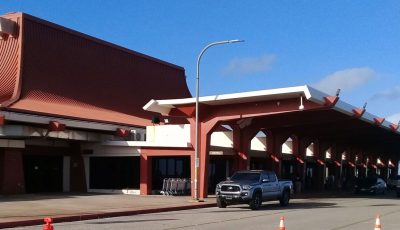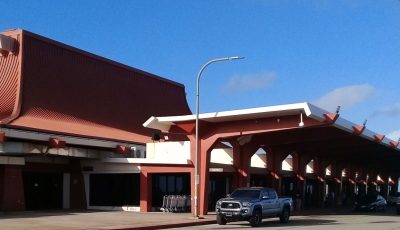FAA gives CPA until July 31 to resolve audit findings
The Federal Aviation Administration has notified the Commonwealth Ports Authority that it will sanction the agency if it fails to resolve by July 31, 2022, all issues in single audit findings, including those found by an auditor again and again in subsequent years.
Such sanctions could result in the suspension or termination of federal awards, initiation of suspension or debarment proceedings, or withholding further federal awards for the project or program, among other actions.
In a letter to CPA executive director Christopher S. Tenorio dated April 21, 2022, a copy of which was obtained by Saipan Tribune yesterday, FAA Office of Airport Compliance and Management Analysis director Kevin C. Willis specifically urged CPA to hire an outside consultant/accounting firm to assist in resolving all single audit findings.
Until then, Willis said, the FAA cannot accept Tenorio’s proposed corrective actions.
CPA board chair Kimberlyn King-Hinds told Saipan Tribune last night that they take this matter seriously and the board, staff, and CPA management have been working hard to resolve those issues since receiving this FAA notice, King-Hinds said one of the action items on that FAA list of tasks to complete was getting the 1% Office of the Public Auditor fee law changed to exempt CPA.
She said the bigger issue is resolving audit findings that have been on the books for many years.
Over the course of these past several months, she said they have established standard operating procedures for procurement and equipment management.
She said they have been conducting training on Saipan, Tinian, and Rota on these SOP’s and have hired a technical consultant to assist management in this process.
To ensure that CPA is compliant moving forward, King-Hinds said they are in the process of hiring an internal auditor to conduct quarterly review.
She said their goal is to wipe the slate clean and hold everyone accountable for keeping it clean and that she is confident that they can get there.
“We do not expect a clean audit because we are taking these corrective measures during the audit period, but I am confident that the next fiscal year will be good,” she said.
Willis noted that they have not received a response to their letter sent to Gov. Ralph DLG Torres on Oct. 13, 2020, which was a follow-up letter regarding the request for a status on the aviation fuel tax action plans.
The FAA official wrote the April 21 letter to Tenorio in response to the latter’s proposed corrective actions, Feb. 11, 2022 response and ongoing issues for CPA’s single audit reports for the biennial periods ending Sept. 30, 2018 and 2020.
He said that, according to CPA’s summary schedule for audit findings in the 2020 single audit, issues pertaining to equipment and real property have been ongoing since 2008.
In addition, Willis said, one finding—2020-002—pertaining to local compliance procurement is a repeat finding from 2019.
He said that, as required by the Code of Federal Regulations, an auditee must promptly follow up and take corrective action on audit findings. In turn, Willis said, the FAA must follow up on audit findings to ensure that the auditee takes appropriate and timely corrective action.
The FAA official said CPA claims to resolve findings in the management responses, yet continues to be written up again and again by its external auditor in subsequent years for the same and/or similar issues.
The external auditor—usually an accounting firm that CPA hires to audit itself— stated in CPA’s 2020 single audit report that “CPA lacks controls, such as oversight responsibility and monitoring, over compliance with equipment and real property management requirements.” The auditor further stated that CPA is in noncompliance with applicable equipment and real property management requirements. Willis noted that the auditor used the same language for noncompliance with procurement rules and regulations.
He said this is a significant concern to the FAA as the largest provider of federal funding to CPA. Willis pointed out that in CPA’s grant obligations, it is bound to keep accounts and records “in accordance with an accounting system that will facilitate an effective audit in accordance with the Single Audit Act of 1984.” He said it is clear CPA cannot resolve these issues on its own and thus cannot effectively manage federal awards in accordance with CFR.
In addition, Willis said, in the 2020 single audit, CPA was written up by the auditor for new issues: 2020-001 non-payroll expenditures, 2020-004 reporting related to SF-425, and 2020-005 allowable costs.
Effective immediately, the FAA is placing “special conditions” on CPA, requiring Airport Improvement Program payments as reimbursements rather than advance payments, he said.
FAA requested CPA to obtain technical or management assistance to resolve all findings and gain auditor acceptance.
Willis said sanctions for non-compliance may result in temporarily withheld cash payments pending correction of the deficiency by the non-federal entity or more severe enforcement action by the federal awarding agency or pass-through entity.
He said sanctions may also result in denying both use of funds and any applicable matching credit for all or part of the cost of the activity or action not in compliance.
He added that sanctions could wholly or partly suspend or terminate the federal award, initiate suspension or debarment proceedings, withhold further federal awards for the project or program, and take other remedies that may be legally available.
On the issue of not responding to FAA’s request for a status on aviation fuel tax action plans, Willis said they asked, among other information, if the Finance secretary has reduced or waived the fuel tax imposed under Public Law 13-17 Section 1403 where “the price of aviation fuel elsewhere and the airline would purchase the aviation fuel in the Commonwealth?”
He said failure to respond within 30 days will result in a recommendation to withhold discretionary grant funding and a notice of investigation by the FAA Office of Airport Compliance and Management Analysis.




























